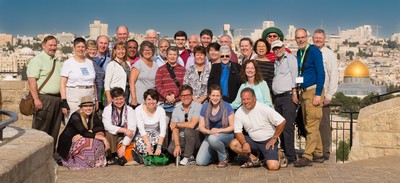For the past week a group of Presbyterians have been witnessing for peace by traveling throughout Israel and Palestine as part of the Presbyterian Peacemaking Program’s 2016 Mosaic of Peace conference. Participants, program coordinator Carl Horton and associate for ecumenical partnerships Kate Taber have been chronicling their experiences on the Peacemaking program’s blog page, Swords into Plowshares.
Five different speakers offered participants their personal insights into the region during a brief orientation session prior to boarding flights to Israel. Amgad Beblawi, PC(USA) area coordinator for the Middle East and Europe; and Ryan Smith, Presbyterian representative to the United Nations, provided Presbyterian mission and policy perspectives. Rachel Lerner, vice president of public affairs for J Street, a pro-Israel, pro-peace organization, shared her personal story as an American Jew and her desire for peace in the region. Doris Salah, a former executive director of the YWCA in Palestine, spoke about being born and raised in a Christian Palestinian family in Jerusalem before the occupation. Rick Ufford-Chase, co-director of Stony Point Center and associate for interfaith relations, discussed cultural sensitivity.
With background in hand, the group arrived safely in Jerusalem and embarked on a tour of the old city which included the Muslim Quarter, the Western Wall and the Temple Mount. The morning’s highlight was a private audience with His Grace Dr. Munib Younan, bishop of the Evangelical Lutheran Church of Jordan and the Holy Land, a PC(USA) partner denomination in the region. Horton’s blog post shared some of the bishop’s inspirational message to his audience, in which he states that the occupation and denial of human rights is what makes life in Jerusalem and the occupied territories virtually unbearable for those without hope or who see no end to the conflict.
“Bishop Younan challenged us to strengthen our relationships with the whole church in the Holy Land,” noted Horton. “The Christian presence is small—less than two percent of the population—but vital and unified. Bishop Younan asked for our continued partnership and accompaniment of Christians who are both suffering and keeping hope alive. They are, he told us, uniquely positioned to be a moderating force for peace.”
Later that same day, the group met with the Rev. Dr. Mitri Raheb, pastor of Christmas Evangelical Lutheran Church and president of Diyar Consortium and Dar al-Kalima University College in Bethlehem. Raheb provided an overview of the ongoing occupation and described the declining Christian presence in Israel, the West Bank and Gaza. He made a correlation between the construction of illegal settlements throughout the Palestinian territory to South Africa’s apartheid regime, which physically divided oppressed populations from one another as a strategy to limit organized resistance. The afternoon was spent at Yad Vashem, the World Holocaust Remembrance Center, and the jam-packed schedule continued into the evening with professor Mustafa Abu Sway, of Al-Quds University in Jerusalem, who provided a Muslim perspective on Israel and Palestine. Abu Sway challenged the group to find connections instead of divisions and refuted the notion that Muslims are violent by citing Islam’s prohibition to provoke violence or war.
The Mosaic of Peace is a conference hosted by the Presbyterian Peacemaking Program. During the conference participants have an opportunity to encounter contemporary Palestinians and Israelis and engage with Christian, Muslim and Jewish leaders while experiencing contextual theology and peacemaking practices within the framework of PC(USA) policy. The 2016 conference runs April 4-16, and additional posts detailing conference experiences and discussions can be found on the Swords into Plowshares blog site.

